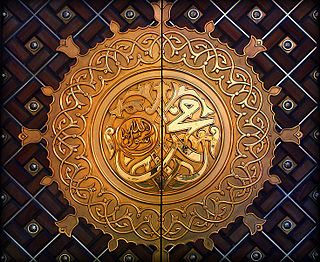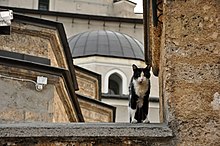
Hadith or Athar refers to what most Muslims and the mainstream schools of Islamic thought believe to be a record of the words, actions, and the silent approval of the Islamic prophet Muhammad as transmitted through chains of narrators. In other words, the ḥadīth are attributed reports about what Muhammad said and did.
In Islam, sunnah, also spelled sunna, are the traditions and practices of the Islamic prophet Muhammad that constitute a model for Muslims to follow. The sunnah is what all the Muslims of Muhammad's time evidently saw and followed and passed on to the next generations. According to classical Islamic theories, the sunnah are documented by hadith, and alongside the Quran are the divine revelation (wahy) delivered through Muhammad that make up the primary sources of Islamic law and belief/theology. Differing from Sunni classical Islamic theories are those of Shia Muslims, who hold that Imams interpret the sunnah, and Sufi who hold that Muhammad transmitted the values of sunnah "through a series of Sufi teachers".

Islamic dietary laws are laws that Muslims follow in their diet. Islamic jurisprudence specifies which foods are halal and which are haram. The dietary laws are found in the Quran, the holy book of Islam, as well as in collections of traditions attributed to the Islamic prophet Muhammad.
Muhammad ibn Isa al-Tirmidhi, often referred to as Imām at-Termezī/Tirmidhī, was an Islamic scholar, and collector of hadith from Termez. He wrote al-Jami` as-Sahih, one of the six canonical hadith compilations in Sunni Islam. He also wrote Shama'il Muhammadiyah, a compilation of hadiths concerning the person and character of the Islamic prophet, Muhammad. At-Tirmidhi was also well versed in Arabic grammar, favoring the school of Kufa over Basra due to the former's preservation of Arabic poetry as a primary source.
Wuḍūʾ is the Islamic procedure for cleansing parts of the body, a type of ritual purification, or ablution. The four Fardh (Mandatory) acts of wudu are washing the face, then the arms, then wiping the head, then washing or wiping the feet, and doing these in order without any big breaks between them.

The Isra andMi'raj, or the Night Journey, are the two parts of a journey that Muslims believe the Islamic prophet Muhammad took during a single night around the year 621 CE. Within Islam, the majority of scholars agree that the journey was both a physical and spiritual one in spite of the physics required for such a journey making it essentially impossible. A brief mention of the story is found in the 17th surah (chapter) of the Quran, called al-Isra', while details of the story are found in the hadith.
Witr is an Islamic prayer (salat) that is performed at night after Isha or before fajr. Witr has an odd number of raka'at prayed in pairs, with the final raka'ah prayed separately.

The hadith of the thaqalayn refers to a statement, attributed to the Islamic prophet Muhammad, that introduces the Quran, the principal religious text in Islam, and his progeny as the only two sources of divine guidance after his death. Widely reported by both Shia and Sunni authorities, the hadith of the thaqalayn is of particular significance in Twelver Shia, where their Twelve Imams are viewed as the spiritual and political successors of Muhammad.
Purity is an essential aspect of Islam. It is the opposite of najāsa, the state of being ritually impure. It is achieved by first removing physical impurities from the body, and then removing ritual impurity through wudu (usually) or ghusl.

Ramadan is the ninth month of the Islamic calendar, and the month in which the Quran is believed to be revealed to the Islamic prophet Muhammad.

The hadith of pen and paper is an incident in which the Islamic prophet Muhammad expressed a wish to issue a written statement shortly before his death, possibly on a Thursday, but was prevented from doing so. Muhammad's intentions are debated though it is commonly believed that the statement would have formally designated his successor. Possibly because of its ramifications throughout the history of Islam, some have referred to this incident as the Calamity of Thursday.
Adi ibn Hatim al-Tai was a leader of the Arab tribe of Tayy, and one of the companions of Muhammad. He was the son of the poet Hatim al-Tai. Adi remained antagonistic to Islam for about twenty years until he converted to Islam in 630.

In some forms of Islamic art, aniconism (the avoidance of images of sentient beings) stems in part from the prohibition of idolatry and in part from the belief that the creation of living forms is God's prerogative.

Muḥammad ibn ʿAbd Allāh ibn ʿAbd al-Muṭṭalib is believed to be the Seal of the Prophets in all of the main branches of Islam. Muslims believe that the Quran, the central religious text of Islam, was revealed to Muhammad by God, and that Muhammad was sent to restore Islam, which they believe did not originate with Muhammad but is the true unaltered original monotheistic faith of Adam, Abraham, Moses, Jesus, and other prophets. The religious, social, and political tenets that Muhammad established with the Quran became the foundation of Islam and the Muslim world.

The ban on Hadith is a historical tradition, which says that Umar, the second Caliph of the Rashidun Caliphate ordered a ban on the writing down of oral traditions about the Islamic Prophet Muhammad, who died in 632 CE. Although the tradition is prominently quoted and referred to, it was not given any formal name, in contrast to other Hadiths such as the Hadith of the pond of Khumm or the Hadith of Qur'an and Sunnah.
According to Islam, animals are conscious of God. According to the Quran, they praise Him, even if this praise is not expressed in human language. Baiting animals for entertainment or gambling is prohibited. It is forbidden to kill any animal except for food or to prevent it from harming people.
Miracles of Muhammad are miraculous happenings attributed to the Islamic prophet Muhammad.
Ishmael is regarded as a prophet and the ancestor to the Ishmaelites in Islam. He is the son of Ibrahim, born to Hajar. Ismail is also associated with Mecca and the construction of the Kaaba. Ismail is considered the ancestor to Muhammad.
Hadith of Jesus Praying Behind Mahdi refers to a collection of hadith (sayings of Muhammad related to the prophecy that after Jesus descends and joins the Mahdi and his followers in the final days before the destruction of Earth, Jesus will decline the offer of the Mahdi to lead the Mahdi and company in salat telling the Mahdi to lead. The Mahdi is an Islamic figure in Islamic eschatology, and salat is the Islamic practice of worship of God. The prophecy is narrated in numerous hadith collections. A total of 29 Hadiths relate the return of Jesus, and his prayer with Mahdi's lead.
Quranism is an Islamic movement that holds the belief that the Quran is the only valid source of religious belief, guidance and law in Islam. Quranists believe that the Quran is clear, complete, and that it can be fully understood without recourse to the hadith and sunnah. Therefore, they use the Quran itself to interpret the Quran, an exegetical principle known as tafsir al-Qur'an bi al-Qur'an.







